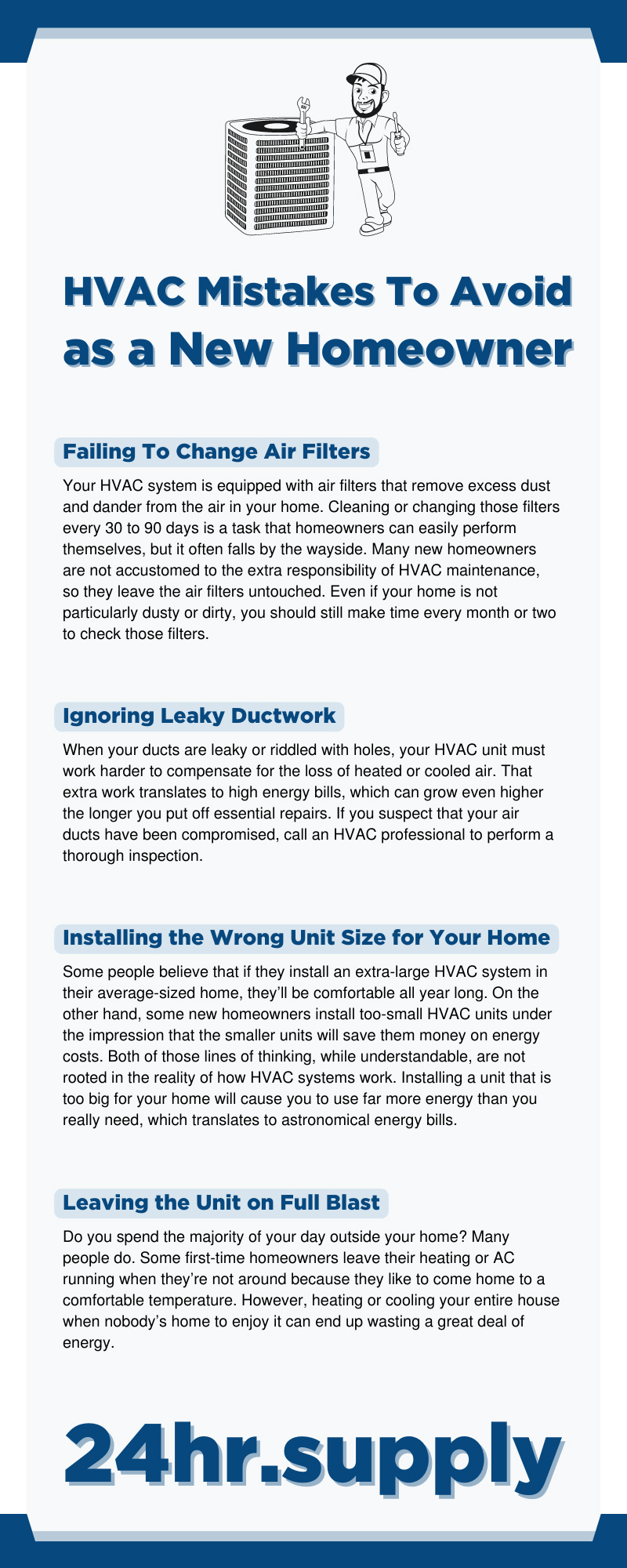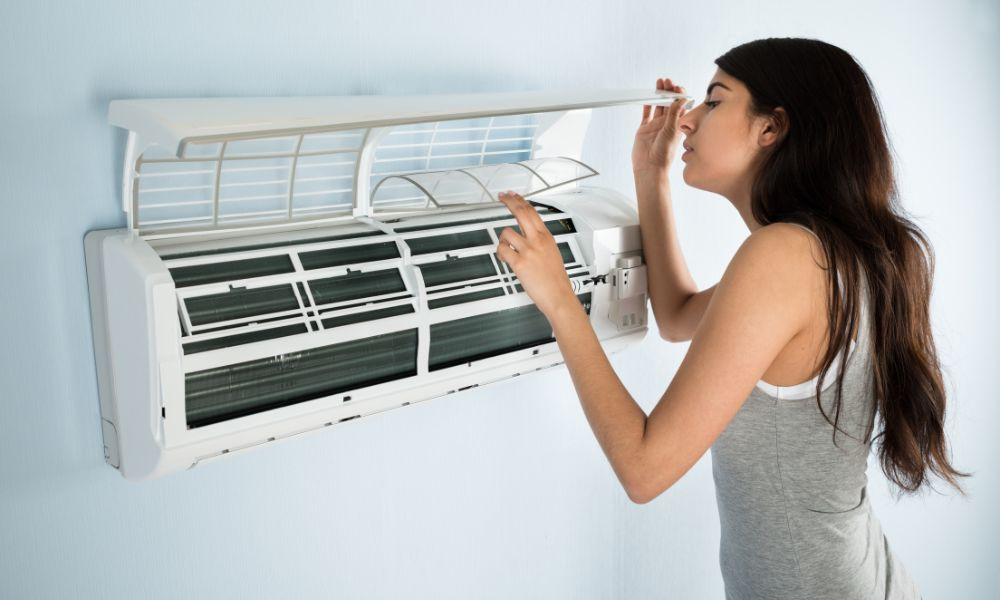HVAC Mistakes To Avoid as a New Homeowner
Have you recently purchased your first home? Congratulations! Homeownership is a rewarding and satisfying experience; it feels good to have a place you can truly call your own. However, with that privilege comes a whole host of new responsibilities. If you own your place, you likely don’t have a maintenance team that takes care of the inner workings of your house for you. Now it’s up to you to keep your living space safe and comfortable.
Cleaning and maintaining your HVAC system is one of your biggest responsibilities as a homeowner. New homeowners often make certain HVAC mistakes, but you can learn from the errors of others to avoid falling into the same patterns yourself. Use this guide to become a more responsible and conscientious homeowner.
Failing To Change Air Filters
Your HVAC system is equipped with air filters that remove excess dust and dander from the air in your home. Cleaning or changing those filters every 30 to 90 days is a task that homeowners can easily perform themselves, but it often falls by the wayside. Many new homeowners are not accustomed to the extra responsibility of HVAC maintenance, so they leave the air filters untouched.
Even if your home is not particularly dusty or dirty, you should still make time every month or two to check those filters. Often, all the filter needs is a quick cleaning to remove dust buildup. However, if you notice any holes or tears in the filter, replace it with a new one to improve your HVAC system’s efficacy.
Ignoring Leaky Ductwork
How much thought do you give to the ducts in your home? If you lived in an apartment before purchasing your home, you may be accustomed to ignoring them and letting the landlord or maintenance team worry about potential leaks. But if you hear the footfalls of small animals rooting around in your ducts or if your energy bill is unreasonably high, you’ll need to have those ducts inspected.
When your ducts are leaky or riddled with holes, your HVAC unit must work harder to compensate for the loss of heated or cooled air. That extra work translates to high energy bills, which can grow even higher the longer you put off essential repairs. If you suspect that your air ducts have been compromised, call an HVAC professional to perform a thorough inspection.
Good To Know:
You might think you can repair duct leaks yourself with duct tape, but that is not correct. The term “duct tape” is a common misnomer; the adhesive on the tape is not strong enough for reliable, long-lasting repairs.
Installing the Wrong Unit Size for Your Home
How big is your new home? First-time homeowners who perform extensive renovations on their new spaces often miscalculate the HVAC unit size they really need. Some people believe that if they install an extra-large HVAC system in their average-sized home, they’ll be comfortable all year long. On the other hand, some new homeowners install too-small HVAC units under the impression that the smaller units will save them money on energy costs.
Both of those lines of thinking, while understandable, are not rooted in the reality of how HVAC systems work. Installing a unit that is too big for your home will cause you to use far more energy than you really need, which translates to astronomical energy bills. And if you install a unit that’s too small for your home, it will strain to heat or cool the entire home adequately.
Pro Tip:
If you want to replace the HVAC unit in your new home, consult with a professional about the size you need. A highly trained HVAC technician will recommend the right size based on the square footage of your home.
Leaving the Unit on Full Blast
Do you spend the majority of your day outside your home? Many people do. Some first-time homeowners leave their heating or AC running when they’re not around because they like to come home to a comfortable temperature. However, heating or cooling your entire house when nobody’s home to enjoy it can end up wasting a great deal of energy.
You don’t have to turn your HVAC unit off every time you leave the house; in fact, you probably shouldn’t. Just turn the temperature down or up a few degrees before you head out so your HVAC system doesn’t work overtime to heat or cool an empty house.
Turning the Unit Off When You’re Away
It may seem like a waste of energy and money to leave your unit running while you’re away on vacation, but you still need some temperature control in your home. Switching the unit off for extended periods of time can cause excessive cold or humidity in your home, depending on the time of year.
If you turn off your AC before leaving for summer vacation, humidity can build up indoors and warp hardwood floors, cause wallpaper to peel, and encourage mold growth. Meanwhile, leaving your HVAC unit off during the winter can cause your pipes to freeze and even burst.
Pro Tip:
Want a home heating solution that won’t waste energy? Consider installing a condensing gas boiler that recycles waste gases from burning fuel. Most condensing boilers boast at least 90 percent energy efficiency and increase the comfort of your home while reducing carbon emissions.
Blocking Vents With Furniture
Once you receive the keys to your new home, walk through it and look for vent grilles on the walls and floors before you move any furniture in. If you cover up a vent with a piece of heavy furniture, that room won’t get heated or cooled properly. Uneven heating and cooling in your home can place excess strain on your HVAC unit and cause your energy bills to rise.
In addition, if you have a guest room in your home that often sits empty, avoid the temptation to close or block the vents in that room. Closing those vents won’t save you any money, and it’ll impact the overall airflow and comfort of your home.
As a new homeowner, your HVAC system is now your responsibility. Familiarize yourself with how the heating and cooling in your new home work, and take care to avoid these HVAC mistakes new homeowners often make as you maintain your system. Should you require repairs or replacements for your HVAC unit, consider calling a professional HVAC technician for additional support.

Recent Posts
-
A Quick Guide To Understanding HVAC Load Calculations
There’s a science behind creating a space that’s both comfortable and energy-efficient. …Jul 17th 2025 -
7 Signs That Your Water Heater Is Leaking
A water heater might not be the flashiest appliance in your home, but when it starts acting up, it c …Jun 27th 2025 -
The Impact of Booster Pumps on Water Quality
Imagine turning on your faucet, only to watch a weak stream of water struggle its way out. It’ …Jun 16th 2025





